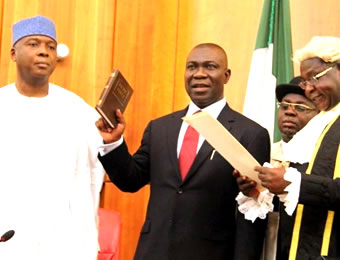Featured
Details Emerged How Senate Rule Book Was Altered — Investigation

Details emerged on Sunday that the decision of the leadership of the National Assembly to effect changes in the Senate Standing Orders 2015 (as amended) was in conformity with precedence and the tradition of the Assembly to regulate its own procedure as guaranteed by the 1999 Constitution.
Tribune Newspaper is reporting that sources close to the National Assembly on Sunday said it would be a misnomer to allege forgery in the alterations, as the Rule Book was printed by the management, following the approval for the printing of the new rules ahead of the inauguration.
A source said the process was in conformity with the tradition set in 1999, where the management prepared the rule books for the Senate and the House.
The source said what the management did was more or less a draft of the Rule Book and that the new Senate has the power to adopt it entirely or propose further amendments in the course of the session.
According to the source, an officer in one of the Senate standing committees, the leadership was covered by precedent in printing the 2015 orders.
The Rule Book that has been amended by the different chambers since the commencement of democracy in 1999 were written in 1998 by the management of the National Assembly, based on international best practices and the rule books of national Assemblies of countries like Canada, Australia, Germany, United States and the United Kingdom.
It was gathered that the current leadership felt the need to effect some changes in the rules to make it in conformity with the yearnings of many senators during parliamentary delegations and induction courses.
“Most of the issues reflected in the induction courses held for the senators in April 2015 after the elections were reflected in the amendment.
“The amendment also encapsulated the report of the last Senate Committee on Rules and Business headed by Senator Ita Enang, which dwells on issues of proper representation of senators at committees and the federal character,” the source said.
He wondered why the police were called in to interfere in the affairs of the National Assembly, which is an independent arm of government.
“What was presented to the lawmakers was actually a draft Rule Book and it was meant to be adopted by the Senate.
“The Senate adopted it on June 24, when Senator Bukola Saraki hit the gavel on it. He ruled Senator Kabir Marafa out of order on his question as to the differences between the 2011 Rule book and that of 2015 and Saraki said the Rule Book adopted for the new session is the 2015 order.
“Senator Ike Ekweremadu also said on the floor on June 24 that each Senate comes up with its own rules as seen in the adopted rules of 1999, 2003, 2007 and 2011,” the source in the National Assembly said.
He added that Section 60 of the 1999 Constitution guaranteed the powers of the National Assembly to regulate its own procedure, adding that such powers included the power to change its rules and adopt same on the floor.
Another source close to the National Assembly legal department said the management reflected the yearnings of most senators who had clamoured for equal representation, while also bringing the rule book up to date on voting procedure.
He said the rule book became effective when the chambers adopted it, adding that this was done on June 24.
“With the adoption of the Rule Book on June 24, it would be a misnomer to indicate that there was forgery to the rules. The management only proposed amendments which the Senate adopted as its Rule for 2015.
“The Ita Enang committee in the last Senate also reflected most of the new amendments. Though that Senate did not consider the report, Senator Marafa raised the matter on the floor of the Senate on June 24 and his point of order was ruled out of order by the Senate President, who announced that the 2015 rule has been adopted.
“From 1999 to 2015, there is no time the executive got involved in the Senate standing rules and it appears they are crossing the line. The police cannot tell a lawmaking body the law to make for itself,” he said.






